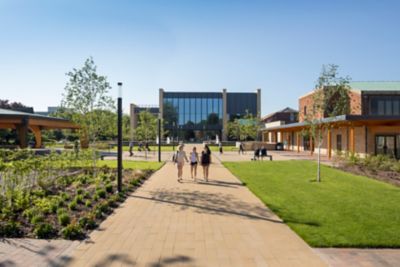-
Study optionsOpen daysCampus informationRelated links
-
About usBrowse by
-
Research impactFacilities and resources
-
Explore news and events

Jeremy Pitcher, Analytical Chemist
Jeremy graduated from the Biochemistry BSc course in 2019 and now works for Premiere Analytical Services.
What does your current Job Role entail?
My current role is focused on DNA and ELISA testing on food products for illegal GMOs and allergens, as well as the authenticity of the ingredients used. Ensuring the safety and quality of products sold to consumers.
How has your degree helped you professionally?
The laboratory sessions throughout my degree, especially my undergraduate group project, have helped me develop a strong foundation of skills and habits which have allowed me to flourish in my first role after university.
What advice would you give to a student embarking on this course?
Actively participate in laboratory sessions, it’s the best environment to develop new skills and confidence in your abilities. For lectures there can be a lot of content, however, I find biochemistry most interesting when I can see the links between different pathways and systems, and understand the overall picture.
George Archie Lagalle, Consultant
George graduated from the Biochemistry and Genetics BSc course in 2021 and currently works for Privatal.
What does your current Job Role entail?
I speak with CFOs in the Benelux region within private equity, and help recruit them for private equity-backed portfolio companies.
How has your degree helped you professionally?
My degree has equipped me with the confidence and social skills to speak with people from a diverse range of backgrounds. I have also learned how to conduct thorough and effective research to carry out my job in an effective way. The nature of my degree has helped me adopt a proactive and effective work ethic that allows me to be rewarded by my hard work.
What advice would you give to a student embarking on this course?
Have an open mind, immerse yourself in every opportunity you can discover. You never know where this degree will take you! It equipped me with vital skills and strengthened my CV to secure my dream job and live the life I’ve always wanted.
Alex Yee, Innovation Technology Analyst
Alex graduated from the Biochemistry BSc course in 2019 and now works for AstraZeneca.
What does your current Job Role entail?
I work in the Digital/IT organisation in AstraZeneca to implement technology across the Oncology R&D organisation and with Oncology patients. My specific role is an Innovation Technology Analyst, where on a day-to-day basis I work as a Project Manager and on other projects a Business Analyst.
As a PM, I would be coordinating the project, keep track of workstreams, managing meetings and ensuring work is completed. As a BA, I would be driving implementation of the core technology with the software developers or any third parties involved.
How has your degree helped you professionally?
Understanding the science is vital to the success of all my projects. Although I am not directly working on the science specifically, it is important that the technology that I am implementing compliments the science that is involved.
For example, whilst managing a project to develop an app for patients in the NHS, the experience we wanted to create was one which could be easily accessible for patients with different cancer types, and provided support to the patient's treatment plan.
What advice would you give to a student embarking on this course?
There are many avenues in a STEM career, although I have friends who love working in a lab, there are also many more opportunities around science which are outside of the lab. It is important to do your research to find out what is out there and what appeals to you.
Zoe Wash, Team Leader at CPI
Zoe graduated from the Biochemistry BSc course in 2019 and currently works for CPI as Team Leader - Synthetic & Mammalian Upstream..
What does your current Job Role entail?
Technical leadership and delivery of RNA therapeutic projects, both material supply and process development, for academic and industrial partners and clients.
How has your degree helped you professionally?
Overall the breadth of knowledge from my degree means that I can apply background knowledge to the projects I work on. University gave me the foundations of scientific practise and exposed me to a range of laboratory and research techniques.
What advice would you give to a student embarking on this course?
If you want to stay in research, try to get a taste of what is available in industry during your degree. Even if you choose to stay in academia you will still need a network in industry. The best way to do this is with a placement year, however, lots of companies offer shorter opportunities to learn what they do.
Related articles

School of Life Sciences
Biology alumni stories
Amy and Alisha studied Biology BSc and Biology MSc. They spoke to us about how their degree's have helped shaped their career paths since graduating.

University of Nottingham
Neuroscience alumni stories
Abigail, Chloe and Helena studied Neuroscience BSc. They spoke to us about how their degree's have helped shape their career paths since graduating.

School of Life Sciences
Zoology alumni stories
Alice and Ellie both graduated in 2019. Find out how their degree's have helped to shape their career paths
Sign up for more information
Thinking about applying to study at the University of Nottingham? We'll send you emails about our courses, funding, accommodation and more.
Sign up for more information
Thinking about applying to study at the University of Nottingham? We'll send you emails about our courses, funding, accommodation and more.

